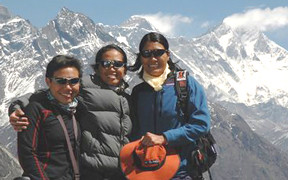Everest conquerer Edmund Hillary dies
By Kazunori Takada
WELLINGTON, Jan 11 (Reuters) - New Zealand's Sir Edmund Hillary, who along with Nepal's Tenzing Norgay Sherpa became the first to conquer Mount Everest, has died. He was 88.
"The legendary mountaineer, adventurer, and philanthropist is the best-known New Zealander ever to have lived. But most of all he was a quintessential Kiwi," New Zealand Prime Minister Helen Clark said on Friday in announcing Hillary's death.
Hillary scaled the world's highest mountain in 1953, telling companions after the climb: "We knocked the bastard off".
The cause of Hillary's death was not announced, but he had been ill for some time and local media reported he had been suffering pneumonia. Radio New Zealand said he died at Auckland
City Hospital on Friday morning.
"He was a colossus. He was an heroic figure who not only knocked off Everest but lived a life of determination, humility, and generosity," said Clark.
Born in Auckland on July 20, 1919, Hillary led an uneventful life until he achieved his Everest triumph at the age of 33.
Then a beekeeper from near Auckland, the strapping six foot (1.83 metre) Hillary was chosen by British expedition leader John Hunt to make the final assault on Everest because of his experience in the Himalayas and immense energy and strength.
Sherpa Tenzing was chosen as his climbing partner.
Hillary and Tenzing set off on a cloudless morning after spending a night at high altitude on the south peak of the infamous South Col. Encumbered by clothing and oxygen equipment that modern climbers would deem museum pieces, they inched ahead until they reached the most formidable problem on the final ridge, a 40 foot (13 metre) rock now known as the Hillary Step.
Hillary "jammed" his way up a narrow crack running vertically up the rock using all his strength and determination and then hauled Tenzing up and they moved on with little to impede them.
At 11.30 a.m. they became the first to step onto the summit of the highest mountain on earth.
For years neither would say who stepped foot on the summit first, but after Tenzing's death in 1986, Hillary revealed it was him.
By late afternoon they were back at the South Col camp and on June 2 word of the conquest was broken by the London Times. The news won huge media coverage, with the "British" triumph coinciding with the coronation day of Britain's Queen Elizabeth and Hillary was knighted even before he descended from Everest.
"It was ground-breaking stuff, trying to find out if the human body could even survive those altitudes in those days," said two-time Everest summit veteran Andrew Lock, Australia's top
high altitude mountaineer.
"He was just the sort of climber that all other climbers looked up to as the absolute pinnacle of appropriate and ethical climbing," said Lock.
After Everest, Hillary led a number of expeditions. In 1958, he and four companions travelled overland in three modified tractors to become the first to reach the South Pole by vehicle.
In the 1960s he returned to the Himalayas in search of the elusive Yeti and in 1975 he led a jetboat expedition to the source of the Ganges.
But most of his energy was devoted to helping Nepal's Sherpa people who live in the shadow of Everest. His Himalaya Trust raised about US$250,000 a year and he personally helped build
schools, hospitals, bridges, pipelines and even an airfield.
"To me he was the greatest adventurer of the 20th Century," millionaire Australian adventurer and philanthropist Dick Smith, who flew solo around the world by helicopter, told Reuters.
Smith, who funds scores of global expeditions, said Hillary's greatest legacy would be the dozens of schools he built and charity work he spearheaded for Nepal.
"Where Ed is different is that his whole life was completely devoted to the people of the Himalayas. He was the bloke who inspired us all," he said.
By Kazunori Takada
WELLINGTON, Jan 11 (Reuters) - New Zealand's Sir Edmund Hillary, who along with Nepal's Tenzing Norgay Sherpa became the first to conquer Mount Everest, has died. He was 88.
"The legendary mountaineer, adventurer, and philanthropist is the best-known New Zealander ever to have lived. But most of all he was a quintessential Kiwi," New Zealand Prime Minister Helen Clark said on Friday in announcing Hillary's death.
Hillary scaled the world's highest mountain in 1953, telling companions after the climb: "We knocked the bastard off".
The cause of Hillary's death was not announced, but he had been ill for some time and local media reported he had been suffering pneumonia. Radio New Zealand said he died at Auckland
City Hospital on Friday morning.
"He was a colossus. He was an heroic figure who not only knocked off Everest but lived a life of determination, humility, and generosity," said Clark.
Born in Auckland on July 20, 1919, Hillary led an uneventful life until he achieved his Everest triumph at the age of 33.
Then a beekeeper from near Auckland, the strapping six foot (1.83 metre) Hillary was chosen by British expedition leader John Hunt to make the final assault on Everest because of his experience in the Himalayas and immense energy and strength.
Sherpa Tenzing was chosen as his climbing partner.
Hillary and Tenzing set off on a cloudless morning after spending a night at high altitude on the south peak of the infamous South Col. Encumbered by clothing and oxygen equipment that modern climbers would deem museum pieces, they inched ahead until they reached the most formidable problem on the final ridge, a 40 foot (13 metre) rock now known as the Hillary Step.
Hillary "jammed" his way up a narrow crack running vertically up the rock using all his strength and determination and then hauled Tenzing up and they moved on with little to impede them.
At 11.30 a.m. they became the first to step onto the summit of the highest mountain on earth.
For years neither would say who stepped foot on the summit first, but after Tenzing's death in 1986, Hillary revealed it was him.
By late afternoon they were back at the South Col camp and on June 2 word of the conquest was broken by the London Times. The news won huge media coverage, with the "British" triumph coinciding with the coronation day of Britain's Queen Elizabeth and Hillary was knighted even before he descended from Everest.
"It was ground-breaking stuff, trying to find out if the human body could even survive those altitudes in those days," said two-time Everest summit veteran Andrew Lock, Australia's top
high altitude mountaineer.
"He was just the sort of climber that all other climbers looked up to as the absolute pinnacle of appropriate and ethical climbing," said Lock.
After Everest, Hillary led a number of expeditions. In 1958, he and four companions travelled overland in three modified tractors to become the first to reach the South Pole by vehicle.
In the 1960s he returned to the Himalayas in search of the elusive Yeti and in 1975 he led a jetboat expedition to the source of the Ganges.
But most of his energy was devoted to helping Nepal's Sherpa people who live in the shadow of Everest. His Himalaya Trust raised about US$250,000 a year and he personally helped build
schools, hospitals, bridges, pipelines and even an airfield.
"To me he was the greatest adventurer of the 20th Century," millionaire Australian adventurer and philanthropist Dick Smith, who flew solo around the world by helicopter, told Reuters.
Smith, who funds scores of global expeditions, said Hillary's greatest legacy would be the dozens of schools he built and charity work he spearheaded for Nepal.
"Where Ed is different is that his whole life was completely devoted to the people of the Himalayas. He was the bloke who inspired us all," he said.

